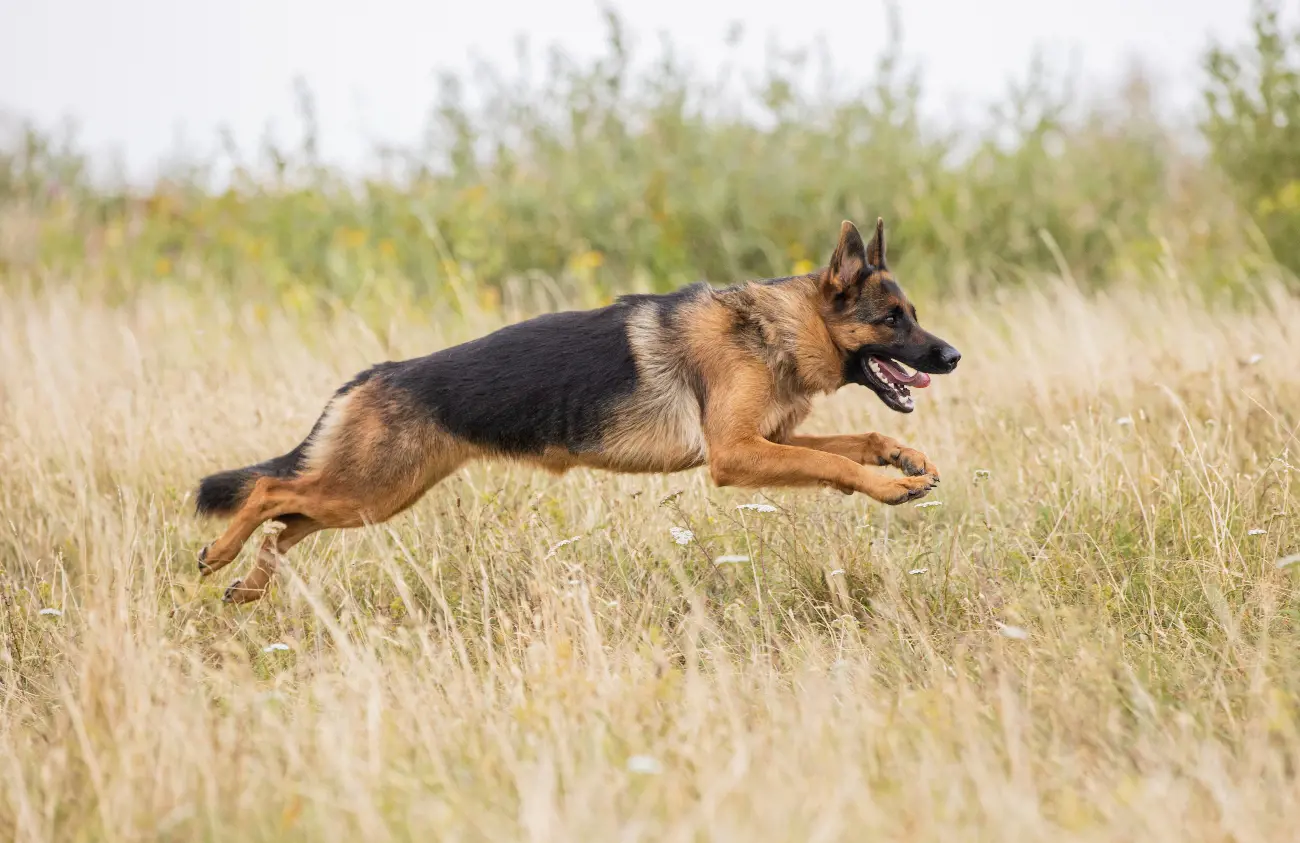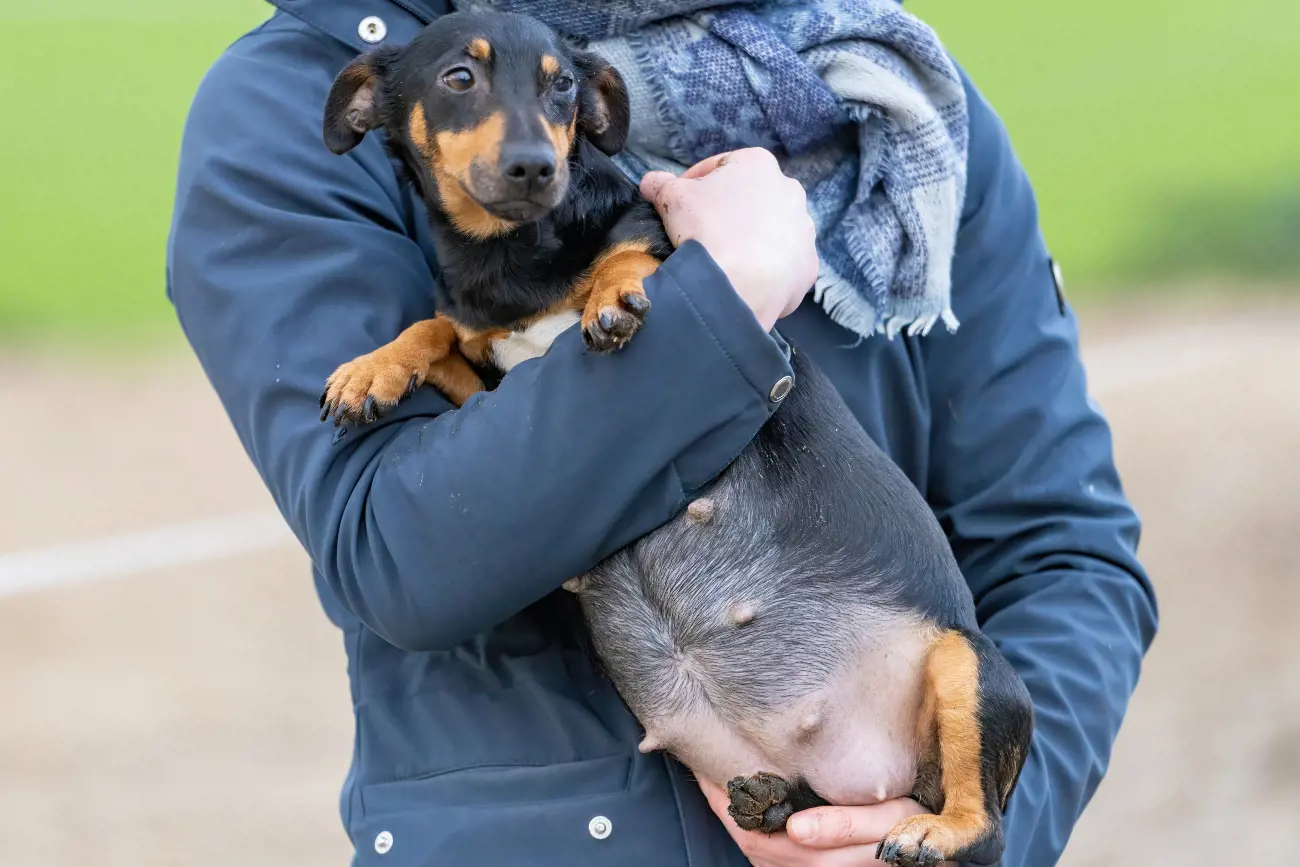How long is a dog pregnant?
19th August, 2022

Most dogs are pregnant for 63 days, but this can range between 56-72 days. Here’s the Purely Pets guide to spotting pregnancy in dogs and how you can help your pet through gestation, birth, and caring for puppies.
During the 9 weeks your canine is pregnant, she needs some extra love and attention. You need to meet with the vet and prepare yourself and your pup for giving birth.
Not sure if she’s carrying a litter yet? We’re here to help! Discover the signs of pregnancy in dogs, what you can do to make her more comfortable and possible problems that can arise.
Do you need dog insurance in the UK for pregnant pups? Whether your dog is carrying a litter or not, she’s an important and loved member of your family and you’ll want to do all you can to protect her.
A lifetime policy like those offered by Purely Pets can help you get the care your dog needs throughout its .
If you’re looking for insurance to cover your pregnant dog, you may want to speak to a pet insurance specialist or find specialised insurance to make sure that you have the cover you’re looking for.
Signs of dog pregnancy
Before trying to breed your dog, you must be sure it’s what you want to do and are well-prepared to provide your canine with all the care she needs.
Once your pup has mated and you’re patiently waiting for her to fall pregnant, you need to know the signs to look out for. Canines only gestate for a short period of around 9 weeks, so the earlier you spot the symptoms, the quicker you can start caring for her properly.
During the early stages of pregnancy, your dog won’t seem a lot different to how she normally is. You might notice her nipples are a little larger and pinker or that her vulva is swollen, but there’s not much more to help you identify she’s pregnant until the weeks progress.Veterinarians often examine the dog's abdomen to detect swelling or changes associated with pregnancy.
When she’s around 40 days into her pregnancy, physical signs begin to show. Obvious clues she’s carrying a litter include:
- Weight gain and a firmer, rounder tummy that starts to hang
- Increased appetite
- Swollen mammary glands from milk production
- Less energy and quieter than usual
- Pacing, digging, and circling around her birthing zone, known as ‘nesting’
Do you need pet insurance in the UK? Many animal charities suggest protecting your pup with pet insurance so you can get them the care they need, when they need it most.
How can my vet tell if my dog is pregnant?
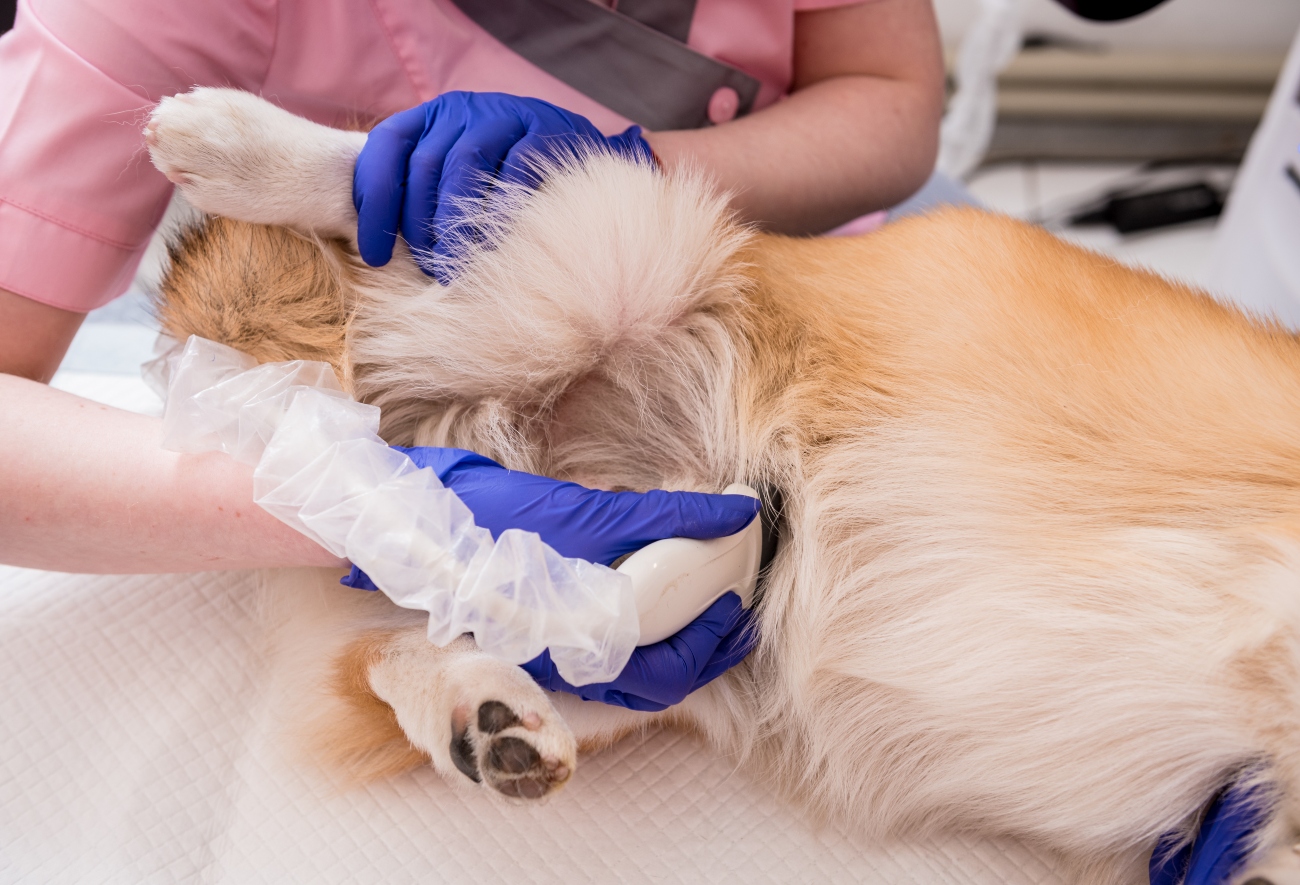
If you suspect your dog is pregnant, take her to the vet. They can perform a few tests to confirm she’s got a litter and determine the stage of the dog's gestation period while checking her overall health if she’s gestating.
These tests might include:
- Blood test: From 25 days after mating, your vet can run blood tests to check for a hormone that indicates your pet is pregnant.
- Ultrasound scan: The vet can perform an ultrasound and you can see the first signs of puppies in the womb 25 days after mating.
- Physical examination: Once your dog is 3-5 weeks pregnant, your vet may be able to feel around for the puppies in her abdomen. However, this isn’t the most effective way to diagnose pregnancy in dogs.
After your vet confirms your pet is pregnant, they can advise you on the next steps. You can find out how far along the 9 weeks of pregnancy your dog is and what you need to do during each stage to keep her healthy and happy.
Do you need pet insurance in the UK? While some policies might not cover pregnancy-related conditions, you still need to protect your pet from illness and injury while she’s caring for her new litter.
Read your policy wording carefully to see what’s covered.
What is a phantom pregnancy in dogs?
Occasionally, you might think your pooch is carrying puppies by how she looks, feels, and acts, only to find out she isn’t when you get her checked. This is called a false or phantom pregnancy and happens because of hormones released after mating season.
If you’re hoping for the pitter patter of tiny paws in the near future, this can be disappointing. It’s very common, though, and around half of all female canines experience a phantom pregnancy in their lifetime unless they get spayed.
When you notice pregnancy symptoms in your pooch, get her to the vet for a professional opinion and to perform tests to find out whether she’s carrying puppies or not.
How to care for your pregnant dog
You noticed the signs, took your dog to the vet, and found out she’s having puppies in the next couple of months! Congratulations! This is an exciting time if you’re a pet owner but also a period where your pup needs all your love and support to keep calm and comfortable.
You can perform a lot of her pregnancy care at home, so do you need pet insurance in the UK while your dog is carrying a litter? We would say yes, because your canine still needs to be protected from accident and illness while she’s carrying her litter.
Lifetime pet insurance is the most comprehensive cover you can get. Purely Pets offers 15 levels to choose from so there’s bound to be one that’s right for you and your budget.
What can you do to care for your dog during pregnancy?
Provide the right diet
As your dog progresses through the 9 weeks of pregnancy, her appetite will increase a lot. In the two or three weeks before she gives birth, she might be demolishing two or three times more food than normal!
To ensure she gets all the nutrients she needs to have a healthy litter of puppies, buy her high-quality dog food or one that’s tailored specifically for pregnant and lactating dogs.
A nutritious diet lowers your pet’s risk of developing problems during pregnancy. Small and frequent meals work best as her growing womb presses on her stomach, making it difficult to eat a lot at once.
According to the Kennel Club, your dog’s nutritional needs depend on the number of puppies inside her.
Check with your vet to see if they can do an ultrasound to estimate how many babies she’s carrying.
Give her enough exercise
As your dog approaches whelping (giving birth), her energy levels drop, and she might not want to exercise as much as you’re used to. This doesn’t mean you can let her lie around all day. Keeping fit is still important during pregnancy.
Encourage your pet to exercise but let her rest when she needs to. Here are some excellent ideas for pregnant pup activities to get her moving without overstimulating:
- Short but frequent walks (three to five a day)
- A game of fetch without throwing the ball too far
- Puzzle toys to keep her stimulated
- Treat hunts to use her heightened sense of smell and reward her growing appetite
Worm your pet more often
When your dog is pregnant, you need to worm her more frequently to stop her passing worms onto her tiny puppies.
Do you need pet insurance in the UK to treat worms? Check what’s included in your policy.
While routine vaccinations are not usually covered, it can help cover the costs of emergency treatment or if your pup falls ill.
Speak to your vet before you give your pregnant dog any worming treatments. Giving your pooch the wrong medication could pose a risk to her and the unborn litter.
Possible problems during a dog pregnancy
When your furry friend gets proper care from a vet and has your support, she shouldn’t experience many problems during her pregnancy. However, certain issues are out of your control and it’s important to be aware of them.
To make sure you understand when something’s wrong, read through these possible problems and how to spot the signs.
Miscarriage
This term refers to a loss of pregnancy and can be caused by a number of factors:
- Stress
- Infection
- Injury
- Traumatic event
- Hormonal issues
- A difficult birth
Sometimes, a dog can lose her puppies so early on that you never realised she was pregnant. If your pup has a miscarriage when she’s a few weeks in, she might experience labour pains, produce milk, and even
Contact your vet as soon as possible when you notice any of these symptoms. Avoid touching your pet if you’re also pregnant and unsure of the cause in case it can also affect humans.
Toxaemia
This problem is rare but can occur during a dog’s pregnancy. When toxins build up in your pet’s blood and she has a lack of energy, toxaemia can occur. It usually happens late during the 9-week gestation period and is more common if your pet is underweight, not eating enough or has a large litter.
Look out for the following signs to spot the issue early on:
- Weakness and wobbliness
- Low energy
- Collapsing and seizures in extreme cases
Your vet can treat toxaemia easily unless you leave it too late, by which time it can become very serious.
Other warning signs
If your dog shows any other worrying signs that she’s not quite right, call your vet for advice. Alternatively, Purely Pets policyholders can access vet video calls with. Staffed by veterinary professionals, they can answer your queries and advise on next steps .
Other warning signs include:
- Weight loss
- Vomiting
- Refusing to eat
- Vaginal discharge or bleeding
Your pet can experience all the usual pregnancy symptoms that humans do, so she may be getting sickness or a bit of spotting that’s nothing to worry about.
However, they can also be the sign of something more serious, so don’t delay – ask an expert for advice if you can.
Prepare your dog’s birthing space
After you find out your dog is having puppies and she’s healthy, you can start preparing a space for her to have her litter. This is sometimes known as a whelping box.
You can buy a premade product or put one together yourself. Ideally, this space will be:
- Comfortable and warm (around 22°C)
- Quiet and secluded from other areas of the house
- Lined with clean and washable bedding
- Big enough for your dog to move, stretch easily and care for her litter
- High sided, to stop puppies escaping but low enough for your dog to step over
How do I know when my dog is in labour?
As the 9-week mark of your dog’s pregnancy approaches, it’s time to look out for signs your pet is entering labour. Your pup’s body starts to prepare for whelping and her birth canal relaxes and widens for the litter to get into the right position.
Labour in dogs lasts roughly six to 12 hours but can sometimes go up to 36 hours. If your pup is giving birth for the first time or she’s particularly nervous, it’s more likely to take longer.
You can tell labour is in progress when you spot the following signs:
- Restlessness
- A drop in temperature
- Shivering
- Panting
- Not eating
- Hiding from you
- Tiredness
- Nesting
- A red/brown mucous passing from her vulva
- Weak contractions
When she’s ready to start having her puppies, she should begin to settle down.
Giving birth
The contractions will get stronger as the puppies are ready to make an appearance! The first one usually takes the longest to be born and can arrive anywhere from 20 minutes to four hours after the strong contractions begin.
Some come out tail-first, but most arrive head-first.
Between each puppy, expect a gap of five minutes to an hour and a half. If your dog is comfortable and doesn’t show signs of stress in this period, she’s okay.
Keep a watchful eye over your furry friend as she has her puppies to make sure everything is progressing as it should.
- Puppies come out in a small sac that the mum removes by licking, allowing them to breathe.
- After each puppy, your pet should pass the placenta, which they often eat. They don’t always come out in the right order, so check that the right number of placentas have passed based on the number of puppies.
- Clear or bloody fluid during birth is normal, but if there’s a lot of blood, call your vet.
- Your dog should be comfortable and licking her newborns between each puppy until the next contraction starts.
- A small amount of green discharge is normal with each puppy, but if there’s thick discharge and the puppies aren’t coming, it signals a problem.
- If you notice your dog straining or experiencing strong contractions for 20-30 minutes without a puppy appearing, call the vet immediately.
It’s best not to try to touch or help your dog with her labour. They don’t usually need assistance, so watching nearby is enough to ensure it’s going to plan and act if trouble arises by contacting your vet.
The birth usually takes between three and 12 hours, with six hours being the average. If it’s much longer than this, and there are still puppies inside, the risk of a problem increases and it’s best to call a vet.
Caring for mum after birth
When your dog has given birth to all her puppies, she’s likely going to be hungry, thirsty, and very tired. Give her time to eat and rest with her litter to bond with them. Provide a quiet space for them to feed and sleep without being disturbed.
If your pet is uncomfortable and can’t relax, there’s a risk she could reject her puppies and refuse to feed. Keep an eye on your dog over the next few days and call your vet if you notice:
- Fever
- Loss of appetite
- Lack of interest in her litter
- Smelly or brown discharge from nipples
- Red and sore mammary glands
- Diarrhoea
- Weight loss
- Foul-smelling or very bloody vaginal discharge
Do you need pet insurance in the UK once your pup has given birth? Ideally, you’ll have a lifelong policy in place in case a health issue arises whether she’s pregnant or not.
The symptoms above can happen days or weeks after whelping, so coverage means you can afford to take her to the vet if necessary.
You’ll also want to cover the new puppies with pet insurance as soon as you can. Here at Purely Pets, we can insure puppies from 8 weeks of.
As mentioned previously, some insurers don’t cover breeding/pregnancy. Specialist insurance may be required, especially if you are looking to breed dogs.
Looking after newborn puppies
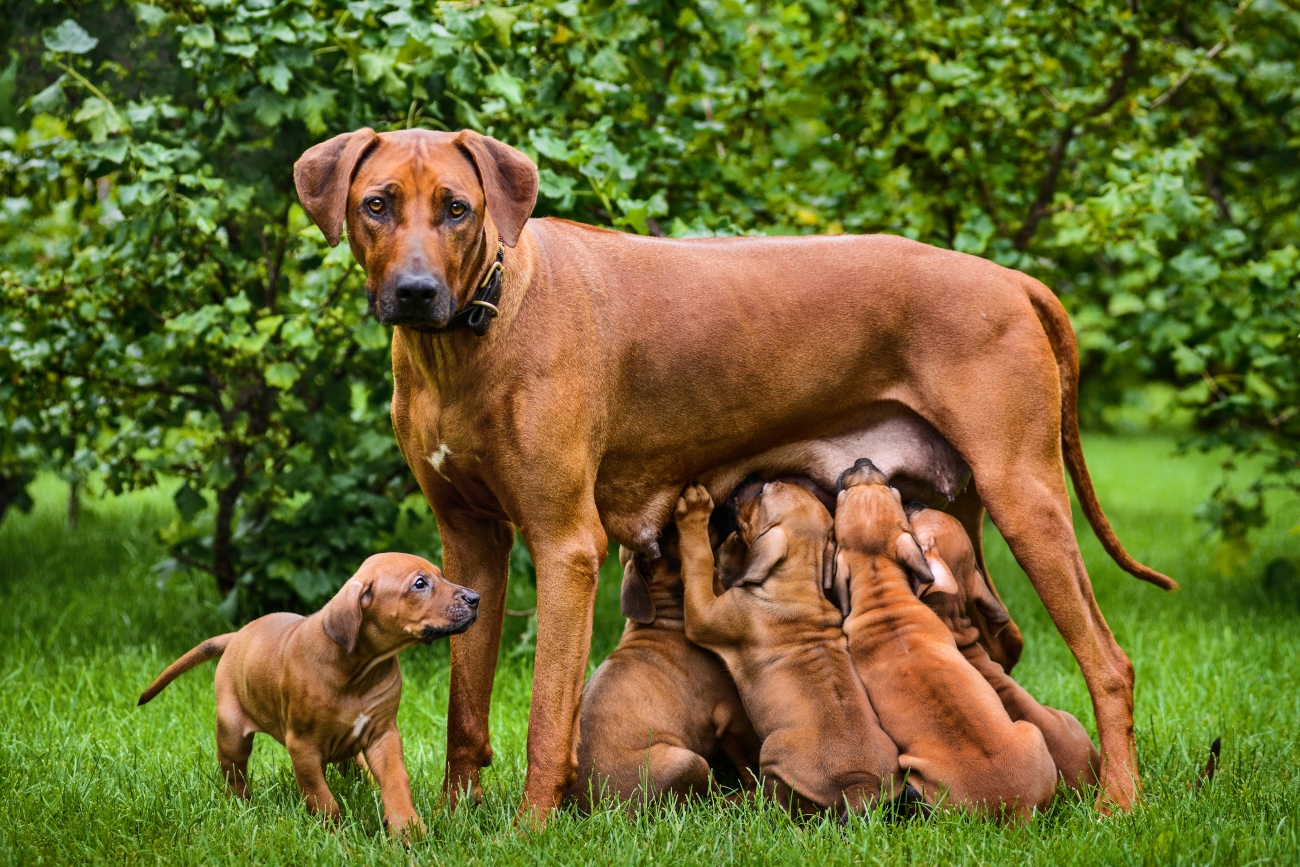
You know how to care for mum post-birth, but what about the litter? You likely have between one and 12 very cute and tiny puppies you also need to look out for.
In the first few weeks of their lives, they need to be kept with their mother. Make sure they have plenty of room to all sleep and feed to promote development and a healthy immune system.
Most puppies feed every 2-3 hours and they can’t eat solids until they reach at least four weeks old. You may also want to consider puppy insurance for your new additions.
Between 4-8 weeks, puppies can enjoy a mix of dry food and milk before moving onto a complete diet of solid food after this period.
During these two months, watch for signs of sickness like vomiting, diarrhoea, excessive crying, and not nursing.
If you notice one of these or the mother rejecting a pup, contact your vet for advice.
Puppies need vaccinations once they reach 8-10 weeks to protect them against diseases, including:
- Kennel cough
- Parainfluenza
- Canine distemper
- Canine parvovirus
- Leptospirosis
If you’re hoping to put your puppies up for adoption, you need to wait until they’re at least 12 weeks old. This helps them become healthy and develop properly before they leave their mother.
Remember, we can offer pet insurance for your pups when they reach. However, if you’re intending to sell your pet, you may need specialist breeder insurance,
Pet insurance for your furry friend
Our insurance can’t cover the costs of a real pregnancy, but as a responsible pet owner, you’ll want to protect both mum and her new puppies when they arrive. Do you need pet insurance in the UK? Well, you never know when your pup might need treatment or medication, and the right coverage can save you money on vets bills - especially if they need emergency care.
At Purely Pets, our specialists can help find a policy to fit your needs and budget. Why choose us?
- Access to vet video calls with JOII
- Cover from 8 weeks old with no upper age limit
- A choice of 15 levels of Lifetime Cover for up to £15,000
- Manage your policy and claim online with ease
- Payments made direct to your vet
Do you need pet insurance in the UK for your furry friend? Contact the Purely Pets team today to get a quick quote.
No matter what your dog’s age, we know what an important part of your family they are.
We’re here to support you and your pet throughout every stage of its life.
Helpful Pages
Recent Posts
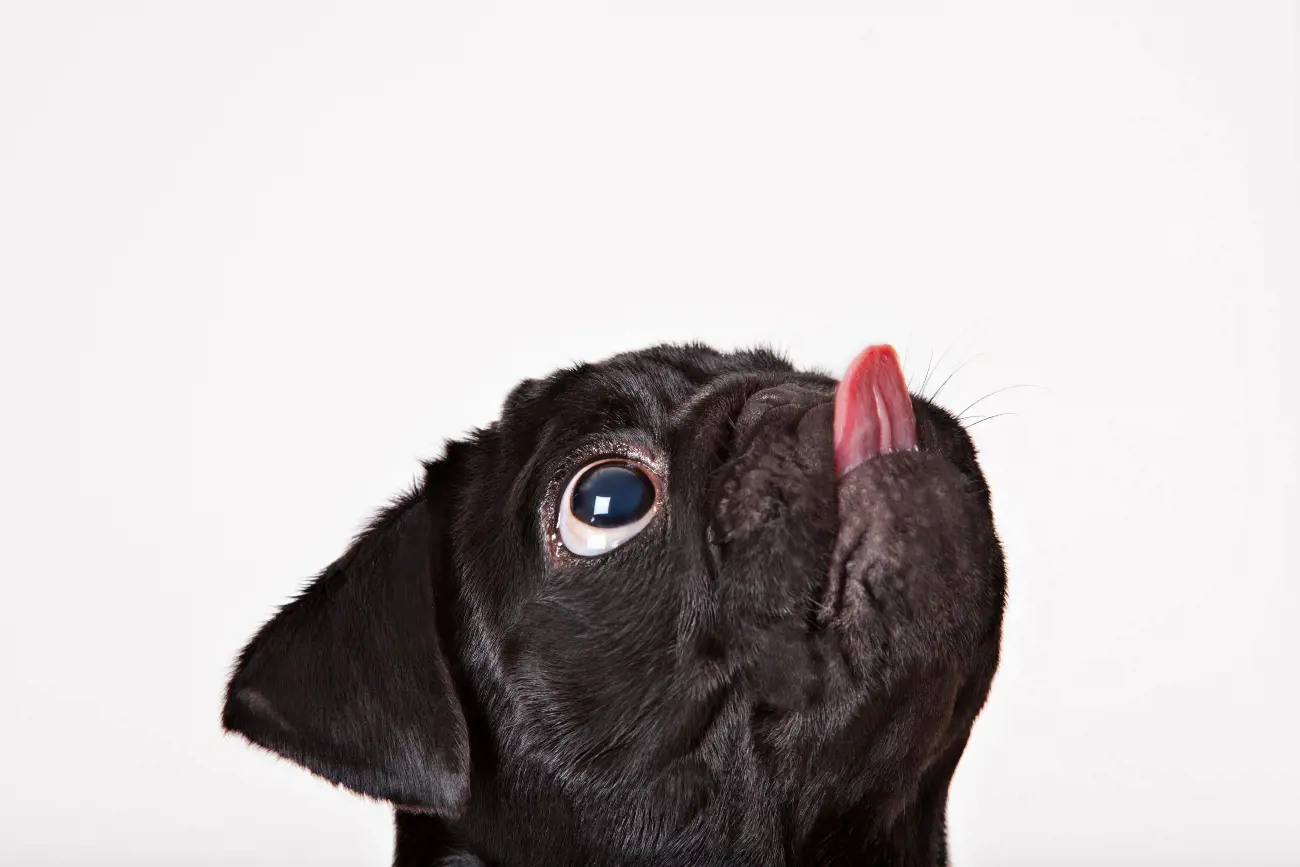
Why do Pugs lick the air?
02/10/24Pet Insurance Quote
- 98% claims paid *
- Claims paid directly to vets
- 24/7 vet video consultations
- Interest free monthly payments


